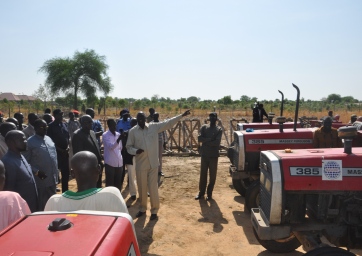Jonglei youth urged to embrace agricultural projects
June 26, 14 (BOR) – The minister of agriculture and forestry in South Sudan’s Jonglei state has urged youth to make use of the tractors the state government and its partners provided for projects aimed at boosting food production.

A number of tractors received from the UN Development Programme (UNDP) two years ago have been provided by the state for youth projects in Jonglei’s 11 counties for use on group and individual farms.
“They (local youth) were given these tractors purposely so that they produce food,” said Ngor.
He said encouraging participation in the agricultural sector was a way to engage youth so that they refrain from criminal activities such as cattle raiding, child abduction and tribal attacks.
It’s hoped the initiative would also mitigate some of the conflict that arises when youth go out looking for food.
“We were targeting youth to make them produce enough food, and when they produce enough, they will be responsible,” the minister said.
South Sudan is currently experiencing acute food shortages since conflict broke out in mid-December last year amid escalating political tensions, with ongoing violence severely disrupting crop planting across the country.
One youth in Bor said the project would create job opportunities for unemployed young people.
“It [will] create more opportunities to those who are redundant; they will be engaged,” he said.
Ongoing insecurity in South Sudan means very few people returned to their farms this season to cultivate their land, with many villages left virtually deserted.
(ST)
